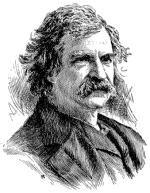Looking at the "field of leadership" (an interesting metaphor!) can be both amusing and frustrating. Those who teach it have, of course, to exemplify it in some way. The easiest way is to appear to be more knowledgeable than others and to be closer to a mythical community of the wise. Offering "inspriing quotes" is part of the process. The following is an example of where this can lead, something that is particularly painful to serious lovers of the arts, who will always prefer the artist's effort to highlight the complexity of reality to the moralist's campaign to simplify it.
 Leadership gurus like to use the following misattributed quote:
Leadership gurus like to use the following misattributed quote:
"The miracle power that elevates the few is to be found in their industry, application, and perseverance, under the promptings of a brave determined spirit." - Mark Twain
In all fairness to Mark Twain, who was known for his sense of irony and his contempt for pretension, the text is not his. It is part of a quote from an unknown source which the young Samuel Clemens (Twain) copied into a notebook. He gave it the title “How to take life”. Twain probably used these words for his own inspiration as a young writer trying to make his mark (not as a team leader!). They reflected the dominant individualist values of the ambitious classes in the U.S. in the 19th century.
It’s interesting to read what immediately precedes the oft-quoted sentence:
“Now and then a man stands aside from the crowd, labors earnestly, steadfastly, confidently, and straightway becomes famous for wisdom, intellect, skill, greatness of some sort. The world wonders, admires, idolizes, and it only illustrates what others may do if they take hold of life with a purpose.”
If this is about leadership, it is about a particularly romantic and probably now outdated U.S. brand of it in which the enterprising individual seeks to become an icon or, as the quote indicate, an idol (it is no coincidence that the TV show is called “American Idol” or that individuals such business-media figures as Donald Trump can still successfully transform themselves into idol-icons even after showy public demonstrations of their fundamental moral and even practical flaws: e.g. personal scandals and bankruptcy). The aim of the individual targeted in the quote is to stand above the others. Admiration and idolization are more important than substance and far more important than shared effort and the good of the community. The elevation “of the few” mentioned by the author whose words Twain copied describes the process of creating an elite – a caste of captains of culture and industry – who will acquire the “right” to dictate to others. As the author says, the individual “stands aside from the crowd” and proves himself without reference to it. Ultimately, by becoming an idol, he may control the destiny of the many.
I would submit (as many leadership experts actually do) that leadership is about interaction, not about isolated glory. The mature Mark Twain – and probably the young one as well, if he had had any reason to think about it -- would have agreed with me! In the field of intercultural communication, when we analyse U.S. culture we identify among its core values two that are highlighted in this quote: control and self-reliance (these are two of the seven core U.S. values developed in Cultural Detective, a method for training people to deal with other cultures). These values may be very positive of course – particularly when they are balanced with social goals – but they may also be sources of perverse action, as can be seen in some aspects of the relations the U.S. has with the rest of the world. This is particularly true, and very visible today, in foreign policy. And these are the values that helped define “the ugly American” back in the 1950s.
Control is a positive value when it leads to creation and innovation by seeking to make things easier and more rational (innovation, invention), particularly when its goal is productivity not just for oneself, but for the many. This is what’s behind the much admired “American ingenuity”. But control quickly becomes negative when it denies significant features of the reality it seeks to control, and is utterly deleterious when it leads to wanting to control everything, to the point of feeling anguish and stress when confronted with elements of reality that are – and should always remain -- beyond its control. It may be symptomatic that our culture is having a harder and harder time recognizing that there actually might be things that should be left beyond our desire to control. Some call this area of denied reality the sacred; others call it simply “the environment”.
Real leaders, of course, do not seek to control; their mission is to build that network with others that will make it possible to control their own well-defined challenges and point out the complex way towards harmonizing the particular efforts of control that each person is making in pursuing his or her own set of tasks. The key to this is not pulling the elaborate set of strings that force people to obey, but rather vision (seeing the whole, comprehensively and holistically) accompanied by communication (helping others to see their role in the whole).
Self-reliance is a positive virtue when it is seen and practised as autonomy, the ability to act without systematic dependence on others and particularly on the appointed elite. But it can become dangerous when it develops into pure competitiveness, the pursuit of isolated personal goals and the refusal of collaboration, communication and communion with others. U.S. culture often fails to distinguish between the two because it has turned the value itself into an icon.
What all cultures need to remember is that there is no positive value that cannot, under social pressure or through the effect of human ambition, transform into a frighteningly negative one. Real leaders remain acutely aware of these dangers.
No comments:
Post a Comment